Unit 2 The boy and the bank officer教案资料
Unit 2-The Boy and the Bank Officer
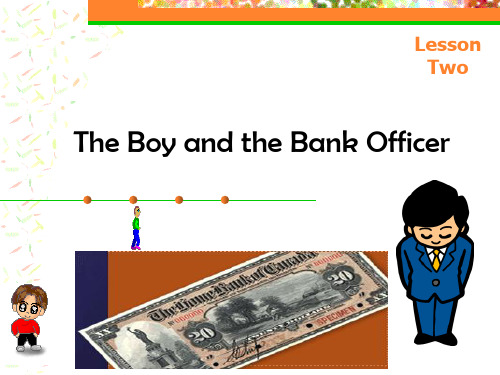
The end of Gend to withdraw money from his own savings account. • The bank officer refused. • The reason was he was not old enough. • The root reason was that the officer tried to help the boy who was forced to give his money to some bad guys.
Cultural background
History of Banks
Banks first emerged in the Middle Ages when people grew tired of carrying around all their gold and began leaving their money with the goldsmith. The Medici family, one of the most prominent banking families in Europe during this time, became quite wealthy from its banking and money lending practices. This 14th-century painting depicts people depositing and withdrawing money in an Italian bank.
Background Information
I. II.
Author Cultural Background
About the Author
Philip Ross (1939— ) is an American writer based in New York. After working as a newspaper reporter for four years, he turned to freelance (自由职业作家) writing. Many of his articles have appeared in the
精读1》第二课theboyandthebankofficer

His Life
W T
B R
Background
A Culture Tip
The Beginning of Banking Banks first emerged in the Middle Ages when people grew tired of carrying around all their gold and began leaving their money with the goldsmith. Until the founding of the Bank of England in 1694, England's goldsmiths were its first bankers. They kept money and other valuables in safe custody for their customers. They also dealt in gold bullion and foreign exchange. They profited from acquiring and sorting coins of all kinds. To attract coins, the smiths were willing to pay interest.
W T B R
Warming up
Check-on Preview
• Fill each blank with one word from the list and find the corresponding explanation.
1. 2. 3. 4. 5. I have a friend who hates banks with a special ___ . …he replied in a voice rising slightly in ___ . You ought to get your parents here and ___ . You know, you really shouldn’t have ___ . I couldn’t believe what this ___ was saying.
The Boy and the Bank Officer
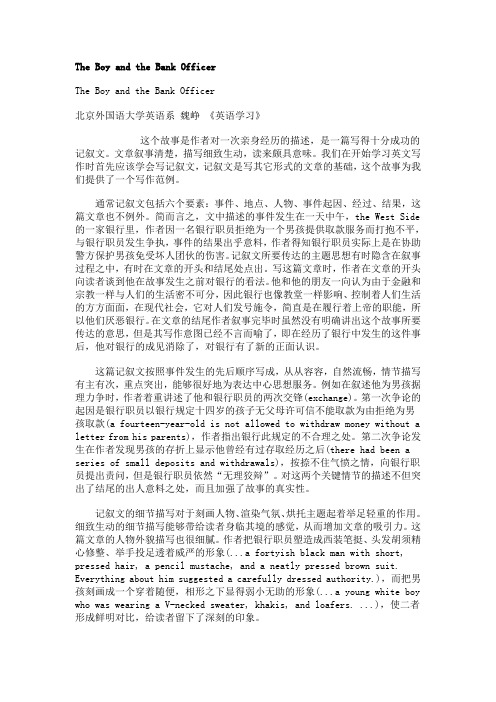
The Boy and the Bank OfficerThe Boy and the Bank Officer北京外国语大学英语系魏峥《英语学习》这个故事是作者对一次亲身经历的描述,是一篇写得十分成功的记叙文。
文章叙事清楚,描写细致生动,读来颇具意味。
我们在开始学习英文写作时首先应该学会写记叙文,记叙文是写其它形式的文章的基础,这个故事为我们提供了一个写作范例。
通常记叙文包括六个要素:事件、地点、人物、事件起因、经过、结果,这篇文章也不例外。
简而言之,文中描述的事件发生在一天中午,the West Side 的一家银行里,作者因一名银行职员拒绝为一个男孩提供取款服务而打抱不平,与银行职员发生争执,事件的结果出乎意料,作者得知银行职员实际上是在协助警方保护男孩免受坏人团伙的伤害。
记叙文所要传达的主题思想有时隐含在叙事过程之中,有时在文章的开头和结尾处点出。
写这篇文章时,作者在文章的开头向读者谈到他在故事发生之前对银行的看法。
他和他的朋友一向认为由于金融和宗教一样与人们的生活密不可分,因此银行也像教堂一样影响、控制着人们生活的方方面面,在现代社会,它对人们发号施令,简直是在履行着上帝的职能,所以他们厌恶银行。
在文章的结尾作者叙事完毕时虽然没有明确讲出这个故事所要传达的意思,但是其写作意图已经不言而喻了,即在经历了银行中发生的这件事后,他对银行的成见消除了,对银行有了新的正面认识。
这篇记叙文按照事件发生的先后顺序写成,从从容容,自然流畅,情节描写有主有次,重点突出,能够很好地为表达中心思想服务。
例如在叙述他为男孩据理力争时,作者着重讲述了他和银行职员的两次交锋(exchange)。
第一次争论的起因是银行职员以银行规定十四岁的孩子无父母许可信不能取款为由拒绝为男孩取款(a fourteen-year-old is not allowed to withdraw money without a letter from his parents),作者指出银行此规定的不合理之处。
最新Unit-Four-The-boy-and-the-bank-officer-教案资料
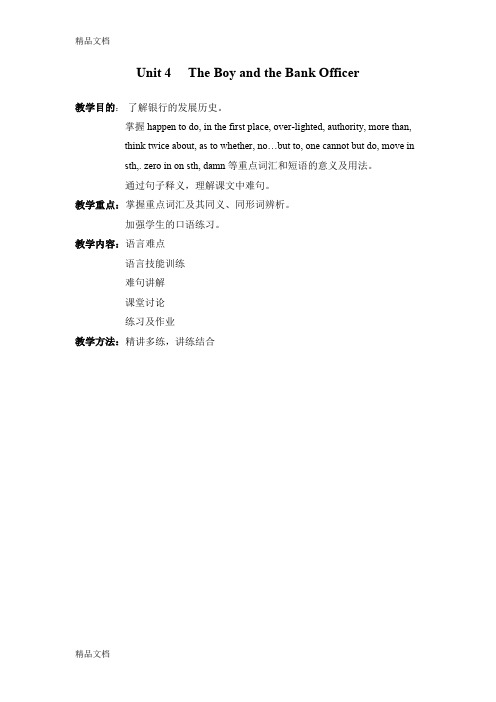
教学目的:了解银行的发展历史。
掌握happen to do, in the first place, over-lighted, authority, more than,think twice about, as to whether, no…but to, one cannot but do, move insth,. zero in on sth, damn等重点词汇和短语的意义及用法。
通过句子释义,理解课文中难句。
教学重点:掌握重点词汇及其同义、同形词辨析。
加强学生的口语练习。
教学内容:语言难点语言技能训练难句讲解课堂讨论练习及作业教学方法:精讲多练,讲练结合Questions for Pre-class reading:1.How do you understand the author’s friend’s attitude toward banks?He hates the bank.A banker is a man who lends you un umbrella when the weather is fair and takes it away from you when it rains.2. What can banks do for us? And what about churches?Keep your money.Churches represent God, give people moral advices and preach moral lessons, tell people what to do and what not to do.3. Why did the author go to bank one day?To open a checking account.4. What did he see in the bank?A school boy tried to withdraw money from the bank.5. Why did the officer refuse to have the boy withdraw money?A fourteen-year-old is not able to withdraw money without a letter from his parents.6. What did the author do then?He thought the bank policy is very ridiculous. He thought what he saw confirmed his friend’s comment on banks. He decided not to open his account and found it a good chance to attack the bank policy.7. What do you think of the ending of the story? What effect may it bring to the story? The exaggeration of the speaker’s anger and determination to attack produces comic(喜剧的;逗人的;幽默的) effect.Appreciation of the text:Plot: a boy’s withdrawal of money from bankSetting: at the bankMain characters: the bank officer, the boy, “I”Theme: traditionally, poor people and people who sympathize them regard bank as evil, or as enemy of the poor. Such suspicions and misgivings still linger on. This article seems to prove that prejudices of people like the author are ungrounded. Structure of the text:Part Ⅰ( para.1) : the attitude of the author’s friend toward the bank.PartⅡ( paras. 2-23): the boy managed to withdraw money from the bank but was kindly refused.Part Ⅲ( paras.24-32): the bank officer cleared the fact.Language Points▲happen to do: occur by chance, take placeShe happened to be out when he called yesterday.When the fire broke out, I happened to be passing by.She happened to be out when he called.I happen to know sth about medicine, so he couldn’t fool me.happen: ---refer to accidental or unplanned eventoccur: ---refer to accidental or unplanned event; more formal than happentake place: suggest that an event is/was planned▲in the first / second…place: ---firstly / secondly…in my / your… place: ---in my situation or circumstances▲. overlighted: --- having too much lightover-: 1)above; outside; acrossovercoat overhead overhang overall2) to excess; too muchovertime overeat over-rich overburdenovercharge overweight overstaffed overwhelm▲fortyish: at about the age of forty-ish: a).. reddish greenish bluish yellowish darkish brownishb). foolish childish babyish boyish womanish snobbishclownishc). English Irish Polish Scottish Finnish SpanishSwedishd). selfish bookishe). fiftyish fortyishf). publish polish punish accomplish abolish astonish establish▲mustache: hair on upper lipbeard: hair growing on man’s chingoatee: short pointed beard▲authority: 1) powers to give orders and make others obey The leader must be a person of authority.2) person or group having the power to give orders or take actionsThe health authority is investigating the matter.3) person with special knowledgeShe is an authority on phonetics.▲more than (para. 4): (colloq.) very; extremely; beyondThey were more than willing to help.Some of the stories were really more than could be believed.more… than…:The child was more frightened than hurt.He always seemed old to me, more like a grandfather than a father.no more than: 1)only; justIt cost me only $5 to buy the book.Before long her white sails were no more than a speck upon the waters.2) the same asHe’s no more able to read Spanish than I am.▲w ear an expression of open disma y (para. 5)She look at her plate with an expression of disgust.▲Hold one’s attentionHe is able to hold the audience’s attention even before he speaks.他甚至能在开口之前就吸引住观众的注意。
2019二年级英语上册Unit2BoysandGirls第2课时教学设计人教新起点
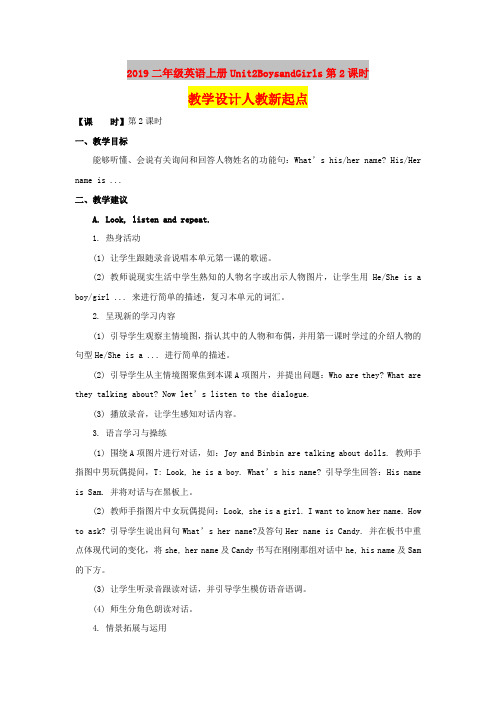
2019二年级英语上册Unit2BoysandGirls第2课时教学设计人教新起点【课时】第2课时一、教学目标能够听懂、会说有关询问和回答人物姓名的功能句:What’s his/her name? His/Her name is ...二、教学建议A. Look, listen and repeat.1. 热身活动(1) 让学生跟随录音说唱本单元第一课的歌谣。
(2) 教师说现实生活中学生熟知的人物名字或出示人物图片,让学生用He/She is a boy/girl ... 来进行简单的描述,复习本单元的词汇。
2. 呈现新的学习内容(1) 引导学生观察主情境图,指认其中的人物和布偶,并用第一课时学过的介绍人物的句型He/She is a ... 进行简单的描述。
(2) 引导学生从主情境图聚焦到本课A项图片,并提出问题:Who are they? What are they talking about? Now let’s listen to the dialogue.(3) 播放录音,让学生感知对话内容。
3. 语言学习与操练(1) 围绕A项图片进行对话,如:Joy and Binbin are talking about dolls. 教师手指图中男玩偶提问,T: Look, he is a boy. What’s his name?引导学生回答:His name is Sam. 并将对话与在黑板上。
(2) 教师手指图片中女玩偶提问:Look, she is a girl. I want to know her name. How to ask? 引导学生说出问句What’s her name?及答句Her name is Candy. 并在板书中重点体现代词的变化,将she, her name及Candy书写在刚刚那组对话中he, his name及Sam 的下方。
(3) 让学生听录音跟读对话,并引导学生模仿语音语调。
The Boy and the Bank Officer解读
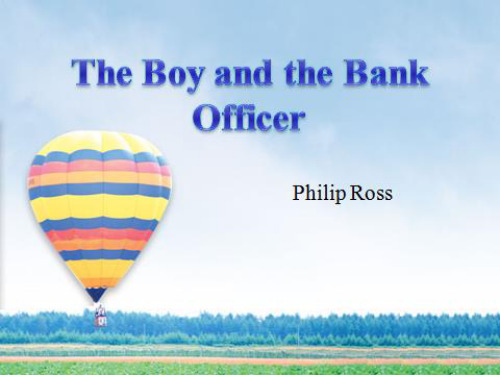
English names for banks in china:
中国银行 Bank of China 中国人民银行 The People's Bank of China 中国工商银行 Industrial and Commercial Bank of China 中国农业银行 Agricultural Bank of China 中国建设银行 China Construction Bank 中国邮政储蓄银行 Postal Savings Bank of China 中国农业发展银行 Agricultural Development Bank of China 中国光大银行 China Everbright Bank 中国民生银行 China Minsheng Banking Corp.,LTD 中国中信银行 China Citic Bank 中国招商(商业)银行 China Merchants Bank
How do you feel about Bank?
• 中国建设银行(CCB):存存不? = China Construction Bank • 中国银行(BC):不存! (BOC: 别零存!) = Bank of China • 中国农业银行(ABC):啊, 不存! • 中国工商银行(ICBC):爱存不存! Bank of China • 民生银行(CMSB):存么?傻B! • 招行(CMBC):存么?白痴! • 兴业银行(CIB):存一百 • 国家开发银行(CDB):存点吧! • 汇丰银行(HSBC):还是不存! Shanghai Banking Corporation = Agricultural Bank of China = Industrial and Commercial = China Minsheng Bank = China Merchants Bank = China Industrial Bank = China Development Bank = The HongKong and
Unit-2-现代大学英语精读第一册The-Boy-and-the-Bank-Officer答案
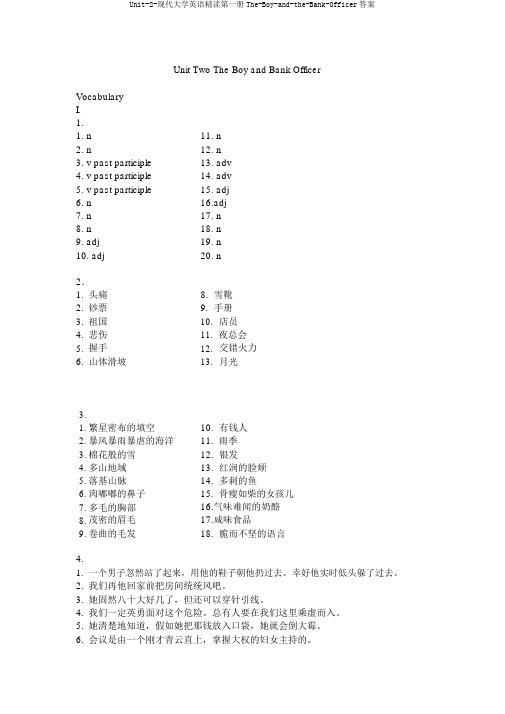
Unit Two The Boy and Bank OfficerVocabularyI.1.1. n11. n2. n12. n3. v past participle13. adv4. v past participle14. adv5. v past participle15. adj6. n16.adj7. n17. n8. n18. n9. adj19. n10. adj20. n2.1.头痛8.雪靴2.钞票9.手册3.祖国10.店员4.悲伤11.夜总会5.握手12.交错火力6.山体滑坡13.月光3.1.繁星密布的填空10.有钱人2.暴风暴雨暴虐的海洋11.雨季3.棉花般的雪12.银发4.多山地域13.红润的脸颊5.落基山脉14.多刺的鱼6.肉嘟嘟的鼻子15.骨瘦如柴的女孩儿7.多毛的胸部16.气味难闻的奶酪8.茂密的眉毛17.咸味食品9.卷曲的毛发18.脆而不坚的语言4.1.一个男子忽然站了起来,用他的鞋子朝他扔过去。
幸好他实时低头躲了过去。
2.我们再他回家前把房间统统风吧。
3.她固然八十大好几了,但还可以穿针引线。
4.我们一定英勇面对这个危险。
总有人要在我们这里乘虚而入。
5.她清楚地知道,假如她把那钱放入口袋,她就会倒大霉。
6.会议是由一个刚才青云直上,掌握大权的妇女主持的。
7.正如老话所说,剥猫皮能够有好多方法。
(不用故步自封)8.一对年青的恋人坠入爱河,仅由于此,他们被人们用石头活活砸死。
9.我希望贫富差距能够减小。
前两天我见到一个饿急了的年青人在一家饭馆里风卷残云地吃残羹剩饭。
10.桌子上的食品看起来是这样的诱人,我都流口水了。
2 Complete the following verb+ noun collocation or expressions.1.have/keep/open/close2.have/keep/ show/ lose3.attend/hold/chair/have/open/close4.change/read/speak5.give/hold6.make/send/save/pay/earn/deposit/withdraw/change/borrow/lend7.wear/show/give/use8.obey/follow/make/change/break9.have/spend/keep/waste/kill/save/count/lose10.protect/represent/considerplete the sentences by translating the Chinese in the brackets according to the sentence patterns in bold.1.is that we can’tfind enough foreign markets2.is that without democracy there is no harmonious society3.is that we should give/allow students more freedom4.is not strong enough to be her husband5.reliable enough to be her husband6.is not big enough to hold so many people7.There doesn’tseem to be any different opinion8.Because at that time there seemed to be enough food for everybody9.Because there didn’tseem to be any good reason at that time.10.because he was being followed at that time11.my car is being repaired/fixed12.I hear it is being criticized by many people13.a good doctor, but he doesn’tknow much about history14.an excellent English professor, but she doesn’tknow much about history15.we may be poor, but we are no beggars16.I shouldn’thave told her in such a hurry.17.I shouldn ’t have gone18.we should have listened to them.4. Fill in blanks with correct forms of the words and phrases listed below1. move in on, happened to 5. Because of, hand over2.aware of 6. the other day, on duty3.heard of7. on the case, as to4.think twice8. in the first place5. Fill in the blanks with the correct prepositions or adverbs.1. on 5. down upon2. into 6. up3. up7. up to4. forward to6. Translate the following sentences into English1.It seemed impossible to me, but all the others looked very confident2.We looked around. There wasn’t building standing in sight. The earthquakeseemed to have destroyed everything.3.–He seemed to be in low spirits these days. I wonder why.--I think it ’s because he doesn’tseem to be making much progress in his studies.He is afraid of being looked down upon by his classmates.4.–What are you looking for, Dick?--I seem to have lost my key. How annoying!5.If you find a word that does not seem to make any sense in the sentence, youshould look it up in the dictionary. That’s the only way to learn to use a word.6.They went on arguing for hours. Neither was willing to listen to the other. Isuddenly remembered someone saying“Discussion is an exchange ofknowledge while argument is an exchange of ignorance”7.The situation there seems to be very complicated. The government has promisedto look into it.8.My grandpa seems to be getting better and better, but he still needs somebodyto look after him.9.Economists have already come to the conclusion that the crisis seems to becoming to an end. World economy is looking up.10.When I got well I looked at my bank account. To my sadness, I found my balancewas almost zero. All my savings in the past three years were gone.7.Fill in each blank with correct form of the appropriate word in the brackets.Note that more than one word may be appropriate1.say, ago2.before, remember/recall3.spoke, say4.speak/tell, after, speak5.After, since6.bring/take, since/because (Use“bring”if she was coming to you, and “take”if shewas leaving you)7.question, since/when8.Remember, bring9.matter, problemGrammar1.Study the given patterns and rewrite the following sentences after the example.1.You ought to invite him to sing at the New Year Party2.You ought to do something a bit more challenging3.We ought to start preparing for celebration4.You ought to relax and stop worrying about him.5.If I knew their phone number, I would surely call them.6.If I was in charge here, I would help you.7.If I was offered the job, I would take it for sure.8.If I had a warm coast with me, I wouldn’tfeel so cold.9.If his parents could afford it, they would support him at college.10.Ted might be able to solve these problems if he were here with us.2.Rewrite the following sentences by using subjunctive mood after the example.1.Jack shouldn ’t have done that /thrown the exam paper to the floor.2.People shouldn’thave wasted waster like that.3.Joe shouldn’t have lied to his parents. / He shouldn’t have spent his parents’hard-earned money like that.4.I should not have given up so easily.5.I should not have jumped the queue. / He shouldn’thave behaved like that.6.Li Tong’s parents shouldn’thave read her private letter without her permission.7.I don’t think the students should have overacted. (They should have called thesecurity on campus)3.Fill in each blank of the passage with ONE suitable word.(1) types/kinds (5) pay (2) lending(6) opening(3) for(7) balance(4) is(8) store/keep/save/put4.Translate the following sentences using one of the patterns listed inGrammar exercises 1-2.1.You ought to try a different method.2.I think you ought to talk with our writing teacher about it.3.we ought to report the theft to the police immediately4.You ought to go and see your parents more often now that they are not ingood health.5.You shouldn’thave shouted at the elders like that6.You shouldn’thave been late for such an important meeting7.Isn’tJim your friend? You shouldn’thave turned down/rejected his offer of help.8.As a college students, you shouldn’t have spent all your free time playingcomputer games.9.If I failed this time, I would try for the second time.10.If global warming continued, these islands would disappear.11.If I had a million yuan, I would buy my parents an apartment12.If I were elected president of the students’union, I might organize a pianocompetition.5.Identify and correct the mistake (s) in each of the sentences.1.No one knew what had happened/ was happening there. No one knows what ishappening/has happened there.2.My parents had a good reason to be angry with me. I shouldn’thave lied to themin the first place.3.The new Prime Minister is well aware that his government is faced with a lot ofproblems./ The new Prime Minister is well aware of the problems hisgovernment is faced with.4.If you won the prize, what would you do with the money.5.The guest was greeted with a bunch of flowers at the airport.6.The teller was arguing with a young customer about something when thenarrator entered the bank.7.The narrator thought the bank’s policy was ridiculous。
Unit-2-The-Boy-and-the-Bank-Officer

Unit 2 The boy and the bank officerPhilips RossTeaching Objective1. Listening: news and dictation2. Speaking: My experience of opening an account in the bank3. Vocabulary:alternative, apparently, branch, bully, conclude, damn, dismay, fortyish, helpless, hopeful, idiot, interfere, irritation, loafer, mustache, neatly, overlit, passion, prep, rear, sandy, savings, series, shake, shrug, slightly, teller, withdrawal4. Grammar: subjunctive mood, model verbs5. Writing: College lifeⅠBackground Information1. Philip Ross (1939—)He is an American writer based in New York. After working as a newspaper reporter for four years, he turned to freelance (自由职业作家) writing. Many of his articles have appeared in the New Yorker (《纽约人》), Reader’s Digest (《读者文摘》) and New York Times (《纽约时报》). This text is taken from Strategies for Successful Writing: A Rhetoric and Reader, 3rd edition published by Prentice Hall, Inc. in 1993 in Englewood Cliffs, New Jersey.2. Functions of banksModern societies cannot do without banks. Banks keep, lend and issue money as well as offering many other financial services. They also help to regulate the economy with changes in interest rate and in money supply. However, traditionally, poor people and people who sympathize with them have regarded banks as evil, as enemies of the poor. Such suspicions and misgivings obviously still linger on. This article seems to prove that the prejudices of people like the author are ungrounded.Plot: a boy’s withdrawal of money from the bankSetting: at the bankProtagonist/Narrator: bank officer, the boy and “I”Theme of the story: Traditionally, poor people and people who sympathize with them have regarded banks as evil, as enemies of the poor. Such suspicions and misgivings obviously still linger on. This article seems to prove that prejudices of people like the author are ungrounded.ⅡWarm-up activities1. Did you ever misunderstand others? How did you deal with your misunderstanding?2. What do you think how banks keep surviving in the modern society?ⅢDetailed study of the textPara 11. passion---a strong feeling or emotionpassionate2. The only difference is that a bank’s goods happen to be money which is yours in the first place.goods---things produced in order to be soldhappen to be/do---to sth by chancee.g. I happened to be on the spot when the traffic accident occurred.3. If banks were required to sell wallets and money belts, they might act less like churches.church---it has certain associations. People usually think of a church as the spokesman of God, as a powerful organization that controls your life and can interfere in your life. Therefore the author thinks it is ridiculous for banks to act like churches.be subjunctiveif …did, …would/might doe.g. If I were you, I would not be here.If it rained tomorrow, we would have to stay at home.Para 24. the other day---recently, several days ago5. overlit---too brightover-, overeat, oversleep6. branch office7. open an account, close an account, settle an accountPara 38. fortyish---about forty---ish---approximately9. pressed hair---a hair style, with the hair straightenedthe black---curl hair10. Everything about him suggested a carefully dressed authority.Everything about him---his clothes, his manner, etc indicated that he was a carefully dressed man who had an important position and who exercised power.Para 411. be aware of---be aware thatbe sure of---be sure that12. a kid from a prep school---a kid from a preparatory schoolPara 513. hold one’s attention---keep one’s attentionpay attention to, distract attention fromPara 614. wear an expression of open dismay---look very worried, disappointed and upsetPara 717. a fourteen year old is not allowed to withdraw moneyallow sb to do stha fourteen-year-old person is too young to take money out of his accountPara 815. “But that doesn’t seem fair”, the boy said, his voice breaking.his voice breaking---with his voice breakingthat doesn’t seem fair, is not as stro ng as that is not fairPara 916. Now if you will excuse meIt is used when one wants to go back to one’s work, or to attend to other customers, or just to end the conversation.Para 1117. I didn’t think twice.I didn’t think very carefully; I said without hesitationPara 1218. Excuse me?---It is used when you disagree with somebody but still want to be polite about it. It means “But why? I don’t understand.”Para 1319. enough20. as to---about21. so-called---used when you think the name given is wrong or improperPara 1422. …in a voice rising slightly in irritation……in a little louder voice which showed that the man was a little annoyed an impatient…23. …I have no other alternative but to follow the rules. alternative---choice…I can’t do it in any other way. There is nothing else I can do.Para 1524. during this exchange---during this exchange of words/during this argument25. a balance of about $100balance---referring to the amount of money one has in one’s bank accountPara 1626. I had my opening.I found a good chance to do or to say something.Para 1927. I moved in for the kill.I began to prepare to kill, destroy or defeat my enemy.Para 2028. How do you explain that?Whan can you say to support this ridiculous logic?29. I zeroed in on the officer.zero in on sb---aim a gun at a targetexaggeration, hyperbolePara 2530. Well, it damn well seemed to me then…damn well---used to emphasize how sure or determined on is about somethingIt is slang and you should not use it in polite society.Para31. inform sb of (doing) sth32. bully---a person who uses his strength or power to frighten or hurt someone who is weaker33. …has been shaking the boy down……has been getting money from the boy by using t hreats.… the boy has been forced to give him money.34. hand it over---give it to that bully35. scared---frightened36. Anyway, the police are on the case.Anyway, the police are working on the case.Para 3237. Not that I ever heard of.I’ve ne ver heard of such a rule.ⅣStructure analysisPart One: (paras 1) The unfavorable opinion of the narrator’s friend on banks.Part Two: (paras 2-32) The narrator’s experience at a West Side bank in New York at lunchtime.ⅤExercises。
Unit2 The Boy and the Bank Officer

《综合英语1》
教案
授课班级:2018级2、3班
授课专业:外国语言文学类
授课学年学期:2018-2019学年上期教师姓名:白美娴
教务处评估处2017年12月制
说明:
1.一次课应备一个教案,每个教案根据实际情况在“课时”一栏中选择相应课时;2.教学目标包括:专业知识、专业能力、基本素养、职业素养、创新创业素养等;3.教学过程(设计)包括:(1)教学任务分配:教师讲授内容(含学科前沿知识)、学生自学内容、教师指导内容;(2)教学过程:复习导入、新课讲授、小结和教学反思;4.作为本课程的第一个教案,“参考教材、参考书目、参考文献”据实填写,以后教案视情况填写或填写“同前”。
二年级上英语Unit2《BoysandGirls》课教案

二年级上英语Unit2《BoysandGirls》课教案一、教学背景本节课为二年级上英语课程中的第二单元,主要内容为介绍男孩和女孩的特征和形象。
学生已经学习了一些基础词汇和句型,因此本次课将会在此基础上拓展更多的词汇和短语,并且引导学生进行简单的对话练习。
二、教学目标1.了解男孩和女孩的一些常见特征;2.学习有关男孩和女孩的基础词汇和短语;3.能够在老师的引导和提示下进行简单的对话练习。
三、教学重点和难点重点1.学习有关男孩和女孩的基础词汇和短语;2.能够在老师的引导和提示下进行简单的对话练习。
难点1.能够正确的运用学习的词汇和短语进行对话练习;2.能够将所学的知识用于实际生活中。
四、教学准备1.PPT 教具;2.课件;3.筆記和筆。
五、教学过程Step 1. 新课导入(10分钟)教学目标:通过 PPT 向学生展示男孩和女孩的外貌特征和性格特点。
1. 介绍单元主题老师拿出课件,让学生看看幻灯片标题,介绍本课的主题为男孩和女孩。
学生可以自由发表自己的看法。
2. 展示男孩和女孩老师通过 PPT 向学生展示男孩和女孩的形象和特点,让学生对他们的外貌和性格进行简单的了解。
3. 学习词汇和短语在展示男孩和女孩的同时,老师也会向学生介绍一些与他们有关的词汇和短语,例如“boy”、“girl”、“strong”、“kind”、“funny” 等,并且强调它们的正确发音和意义。
Step 2. 对话练习(25分钟)教学目标:通过对话练习,让学生能够正确运用所学词汇和短语进行简单交流。
1. 组织对话小组老师根据班级情况,组织学生进行对话小组练习,让学生按照男孩和女孩分组,分别进行对话练习。
2. 给出对话话题老师给出对话话题,例如“男孩喜欢什么运动”、“女孩喜欢什么食物”等,让学生根据话题进行简单的对话练习。
3. 引导对话老师可以给出一些对话模板和句型,例如“Do you like…”、“I like…”等,帮助学生更好地进行对话练习。
当代商务英语综合教程2 Unit 14 The Boy and the Bank Officer

2
Warm-up Questions:
Warm-up Questions: 1. You may have had the experience of going to banks. What's your impression of the bank clerks? 2. List some terms related with bank services.
3
Pre-class Task 1
Pre-class Task 1 Read the text once for the main idea(s). Do not refer to the notes, the glossary or dictionaries.
4
Text A The Boy and the Bank Officer
5
The boy continued to hold my attention because of what happened
next.
7
Text A The Boy and the Bank Officer
Passage
6
He was holding an open savings-account book and wearing an
my money. I put it in. It's my account.”
9
“I know it is,” the officer said, “but those are the rules. Now if
you'll excuse me.”
10 He turned to me with a smile. “May I help you, sir?”
The_Boy_and_the_Bank_Officer综合英语1_课文原文
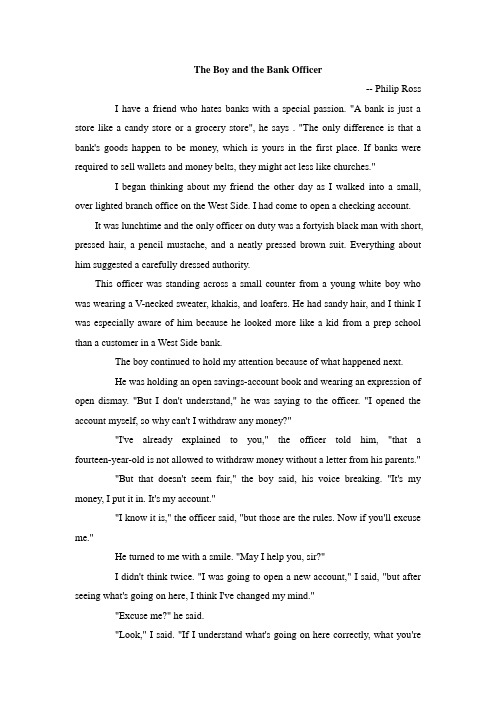
The Boy and the Bank Officer-- Philip RossI have a friend who hates banks with a special passion. "A bank is just a store like a candy store or a grocery store", he says . "The only difference is that a bank's goods happen to be money, which is yours in the first place. If banks were required to sell wallets and money belts, they might act less like churches."I began thinking about my friend the other day as I walked into a small, over lighted branch office on the West Side. I had come to open a checking account.It was lunchtime and the only officer on duty was a fortyish black man with short, pressed hair, a pencil mustache, and a neatly pressed brown suit. Everything about him suggested a carefully dressed authority.This officer was standing across a small counter from a young white boy who was wearing a V-necked sweater, khakis, and loafers. He had sandy hair, and I think I was especially aware of him because he looked more like a kid from a prep school than a customer in a West Side bank.The boy continued to hold my attention because of what happened next.He was holding an open savings-account book and wearing an expression of open dismay. "But I don't understand," he was saying to the officer. "I opened the account myself, so why can't I withdraw any money?""I've already explained to you," the officer told him, "that a fourteen-year-old is not allowed to withdraw money without a letter from his parents.""But that doesn't seem fair," the boy said, his voice breaking. "It's my money, I put it in. It's my account.""I know it is," the officer said, "but those are the rules. Now if you'll excuse me."He turned to me with a smile. "May I help you, sir?"I didn't think twice. "I was going to open a new account," I said, "but after seeing what's going on here, I think I've changed my mind.""Excuse me?" he said."Look," I said. "If I understand what's going on here correctly, what you'resaying is that this boy is old enough to deposit his money in your bank but he's not old enough to withdraw it. And since there doesn't seem to be any question as to whether it's his money or his account, the bank's so-called policy is clearly ridiculous.""It may seem ridiculous to you," he replied in a voice rising slightly in irritation, "but that is the bank's policy and I have no other choice but to follow the rules".The boy had stood hopefully next to me during this exchange, but now I was just as helpless. Suddenly I noticed that the open savings book he continued to grasp showed a balance of about $100. It also showed that there had been a series of small deposits and withdrawals.I had my opening."Have you withdrawn money before by yourself?" I asked the boy."Yes," he said.I moved in for the kill."How do you explain that?" I zeroed in on the officer. "Why did you let him withdraw money before, but not now?"He looked annoyed. "Because the tellers were not aware of his age before and now they are. It's really very simple".I turned to the boy with a shrug. "You're really getting cheated," I said. "You ought to get your parents to come in here and protest."The boy looked destroyed. Silently, he put his savings book in a rear-pocket and walked out of the bank.The officer turned to me. "You know," he said, "you really shouldn't have interfered.""Shouldn't have interfered?" I shouted. "Well, it damn well seemed to me that he needed someone to represent his interests.""Someone was representing his interests," he said softly."And who might that be?""The bank."I couldn't believe what this idiot was saying. "Look," I concluded, "we're justwasting each other's time. But maybe you'd like to explain exactly how the bank was representing that boy's interests?""Certainly," he said. "We were informed this morning that some neighborhood bully has been shaking this boy down for more than a month. The other guy was forcing him to take money out every week and hand it over. The poor kid was apparently too scared to tell anyone. That's the real reason he was so upset. He was afraid of what the other guy would do to him. Anyway, the police are on the case and they'll probably make an arrest today.""You mean there is no rule about being too young to withdraw money from a savings account?""Not that I ever heard of. Now, sir, what can we do for you?"Glossary:AlternativeApparentlyBranchBullyConcludeDamnDismayFortyishHelpless HopefullyIdiot savings teller shrugInterfereIrritationLoafer Mustache Neatly passion sandy series shake slightly OverlitProtest rearWithdrawal。
2-Unit-two-The-boy-and-the-bank-officer-教案
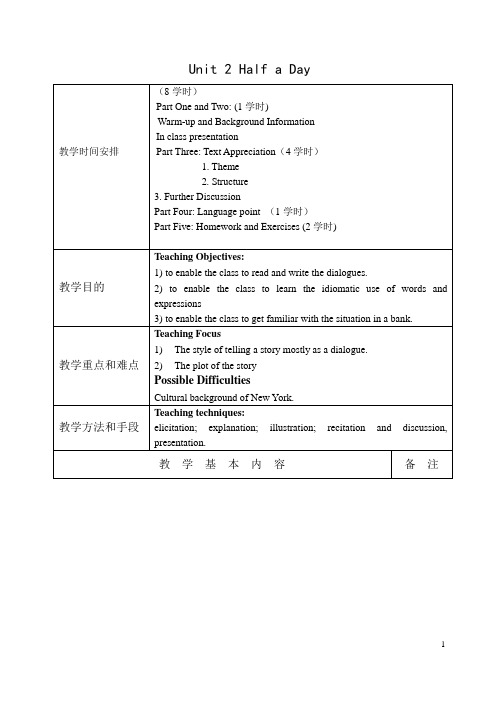
He thought the bank policy is very ridiculous. He thought what he saw confirmed his friend’s comment on banks. He decided not to open his account and found it a good chance to attack the bank policy.
He hates the bank.
A banker is a man who lends you un umbrella when the weather is fair and takes it away from you when it rains.
2. What can banks do for us? And what about churches?
2.Appreciation of the text:
Plot: a boy’s withdrawal of money from bank
Setting: at the bank
Main characters: the bank officer, the boy, “I”
Theme: traditionally, poor people and people who sympathize them regard bank as evil, or as enemy of the poor. Such suspicions and misgivings still linger on. This article seems to prove that prejudices of people like the author are ungrounded.
现代大学英语第一册教案
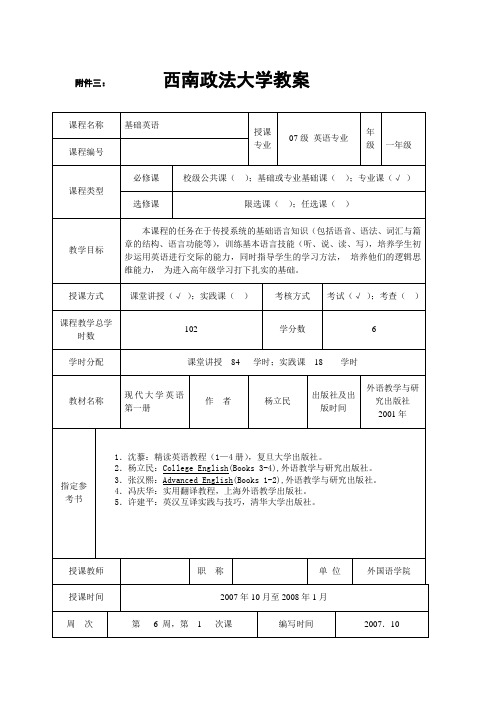
思考题或作业
周 次 章节名称 授课方式 教 学 内 容 的 重 点 和 难 点
第
7 周,第 6
次课
编写时间
2007.10
Unit 3 Message of the Land
课堂讲授( ) ,实践课( ) 教学时数 2 时间分配
1. 掌握重点词汇及其同义、同形词辨析。
2. 明喻和暗喻写作修辞手法。 3.加强学生的口语练习。
师生活动设计
Questioning and answering
思考题或作业 周 次
Prepare the next unit 第 7 周,第 5 次课 编写时间 2007.10
章节名称
Unit 3 Message of the Land
授课方式 教 学 内 容 的 重 点 和 难 点
课堂讲授( ) ,实践课( )
授课方式 课程教学总学 时数 学时分配
102
学分数
6
课堂讲授 84
学时;实践课 18
学时 外语教学与研 究出版社 2001 年
教材名称
现代大学英语 第一册
作
者
杨立民
出版社及出 版时间
指定参 考书
1.沈藜:精读英语教程(1—4 册) ,复旦大学出版社。 2.杨立民:College English(Books 3-4),外语教学与研究出版社。 3.张汉熙:Advanced English(Books 1-2),外语教学与研究出版社。 4.冯庆华:实用翻译教程,上海外语教学出版社。 5.许建平:英汉互译实践与技巧,清华大学出版社。
教 学 内 容 的 深 化 和 拓 展
Structure Part 1: The wife‟s speech (para. 1- 3) The wife tells us briefly about each member of her family and how all her children left.
恒心TheBoyandtheBankOfficer自学辅导课件

The Boy 被盗案情经过
The Boy 的困境起因于一次钱包被盗的事件,这成为他追求财务独立的触发点。
The Boy 向银行申请贷款的原因
The Boy 面临困境,决定通过银行贷款来实现自己的梦想,这将揭示银行贷款的重要性。
银行规定和程序的介绍
教授 The Boy程序。
主人公介绍:The Boy
年轻男孩身负家庭期望,面临生活困境,表现出坚定的决心和勇气,从而寻 求解决办法,实现梦想。
银行职员:Bank Officer
故事中的银行职员在 The Boy 实现梦想的过程中起到重要指导和协助的角色。
钱包的重要性
故事中提到的钱包象征财务管理和人们追求财务自由的需求。
恒心 The Boy and the Bank Officer 自学辅导课 件
这个自学辅导课件将带您深入了解《恒心 The Boy and the Bank Officer》这个 故事的背景,并分享故事中主人公的经历和银行职员的角色。
故事背景介绍
讲述一个年轻男孩通过固定存款实现梦想的励志故事,向大家展示一份不屈 不挠的恒心,成功的原因。
unit 2 voc---the boy and the bank officer

① interfere with: to prevent sth. from succeeding or from happening in the way that was planned Example: Anxiety can interfere with children’s performance at school.
8. interfere
1. sb interferes in a situation干涉;干预;介入。E.g. The
UN cannot interfere in the internal affairs of any country. 2. sth interferes with a situation妨碍;冲突;抵触。 E.g. Smoking and drinking interfere with your body's ability to process oxygen.
A checking account=a current account 活期账户
18.withdraw
v. a. to take money out of a bank account Example: Liz withdrew $100 from her account.
b. to remove sth. or take it away or take it back, often because of an official decision Example: She withdrew a document from her briefcase.
14. protest
Protest against 造句
申辩,申明 If you protest that something is the case, you insist
- 1、下载文档前请自行甄别文档内容的完整性,平台不提供额外的编辑、内容补充、找答案等附加服务。
- 2、"仅部分预览"的文档,不可在线预览部分如存在完整性等问题,可反馈申请退款(可完整预览的文档不适用该条件!)。
- 3、如文档侵犯您的权益,请联系客服反馈,我们会尽快为您处理(人工客服工作时间:9:00-18:30)。
Theme of the story:Traditionally, poor people and people who sympathize with them have regarded banks as evil, as enemies of the poor. Such suspicions and misgivings obviously still linger on. This article seems to prove that prejudices of people like the author are ungrounded.
1.He had come open a checking account. (Para.2) 2.Because the bank officer said that ,’a fourteenyear-old is not allowed to withdraw money without a letter from his parents.’( Para.7 ) 3. He was a fortyish black man with short, pressed hair, a pencil mustache, and a neatly pressed brown suit. No, he didn’t. Because everything about him suggested a carefully dressed authority. (Para.3) 4. Why did you let him withdraw money before, but not now?’ (Para.20) 5. Because they are protecting the boy’s interests.
6.The boy hasn’t withdrawn money before by himself? 7.Silently, the boy put his savings book in a front-pocket and walked out of the bank. 8.Some neighborhood bully has been shaking this boy down for more than a month. 9.There is a rule about being too young to withdraw money from a savings account. 10.At last the author didn’t open a new account because of what he had seen.
Decide whether the following statements are True or False. 1.The author had come to deposit money in the bank. 2.The only officer on duty was a fiftyish white man. 3.The little boy was holding an open savingsaccount book and wanted to withdraw money. 4.The boy’s problem was that he couldn’t withdraw his money. 5.The boy’s open savings book showed a balance of about $100.
Text Analysis Plot of the story Setting of the story Protagonists of the story Writing techniques of the
story Theme of the story
Writing techniques: Hyperbole: A figure of speech in which conscious exaggeration is used without the intent of literal persuasion. It may be used to heighten effect, or to produce comic effect. 1.I moved in for the kill. (para. 19) 2.I zeroed in on the officer. (para. 20) 3.His eyes fell on the page, but his mind was a million miles away. 4.I will love you till the sea’s gone dry, the rocks melt with the sun.
Unit 2 The boy and the bank officer
I. Warm-up
1.Why did the author go to the bank one day? 2. Why did the boy have trouble withdrawing his money? 3. What did the bank officer look like? Did the author like him immediately? Why or why not? 4. How did the author argue on the boy’s behalf? 5. Why did the officer refuse to let the boy withdraw his own money?
Rewrite the following sentences by using “Hyperbole”. 1) Thanks a lot. 2) I’m very hungry. 3) He is very eloquent 4) Wisdom is more important than books 5) They laughed heartily.
